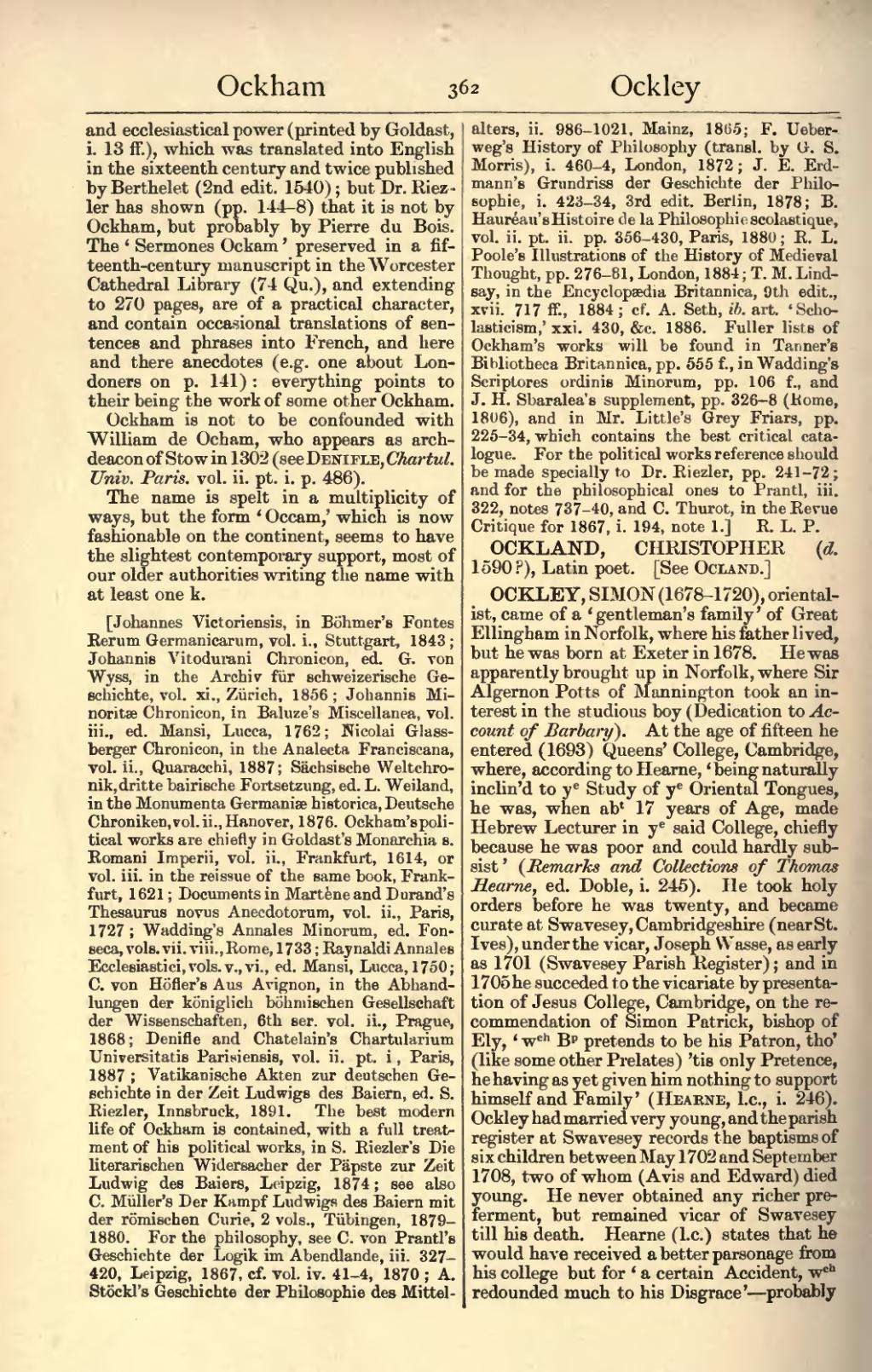and ecclesiastical power (printed by Goldast, i. 13 ff.), which was translated into English in the sixteenth century and twice published by Berthelet (2nd edit. 1540); but Dr. Riezler has shown (pp. 144–8) that it is not by Ockham, but probably by Pierre du Bois. The ‘Sermones Ockam’ preserved in a fifteenth-century manuscript in the Worcester Cathedral Library (74 Qu.), and extending to 270 pages, are of a practical character, and contain occasional translations of sentences and phrases into French, and here and there anecdotes (e.g. one about Londoners on p. 141): everything points to their being the work of some other Ockham.
Ockham is not to be confounded with William de Ocham, who appears as archdeacon of Stow in 1302 (see Denifle, Chartul. Univ. Paris'. vol. ii. pt. i. p. 486).
The name is spelt in a multiplicity of ways, but the form ‘Occam,’ which is now fashionable on the continent, seems to have the slightest contemporary support, most of our older authorities writing the name with at least one k.
[Johannes Victoriensis, in Böhmer's Fontes Rerum Germanicarum, vol. i., Stuttgart, 1843; Johannis Vitodurani Chronicon, ed. G. von Wyss, in the Archiv für schweizerische Geschichte, vol. xi., Zürich, 1856; Johannis Minoritæ Chronicon, in Baluze's Miscellanea, vol. iii., ed. Mansi, Lucca, 1762; Nicolai Glassberger Chronicon, in the Analecta Franciscana, vol. ii., Quaracchi, 1887; Sächsische Weltchronik, dritte bairische Fortsetzung, ed. L. Weiland, in the Monumenta Germaniæ historica, Deutsche Chroniken, vol. ii., Hanover, 1876. Ockham's political works are chiefly in Goldast's Monarchia's. Romani Imperii, vol. ii., Frankfurt, 1614, or vol. iii. in the reissue of the same book, Frankfurt, 1621; Documents in Martène and Durand's Thesaurus novus Anecdotorum, vol. ii., Paris, 1727; Wadding's Annales Minorum, ed. Fonseca, vols. vii. viii., Rome, 1733; Raynaldi Annales Ecclesiastici, vols. v., vi., ed. Mansi, Lucca, 1750; C. von Höfler's Aus Avignon, in the Abhandlungen der königlich böhmischen Gesellschaft der Wissenschaften, 6th ser. vol. ii., Prague, 1868; Denifle and Chatelain's Chartularium Universitatis Parisiensis, vol. ii. pt. i., Paris, 1887; Vatikanische Akten zur deutschen Geschichte in der Zeit Ludwigs des Baiern, ed. S. Riezler, Innsbruck, 1891. The best modern life of Ockham is contained, with a full treatment of his political works, in S. Riezler's Die literarischen Widersacher der Päpste zur Zeit Ludwig des Baiers, Leipzig, 1874; see also C. Müller's Der Kampf Ludwigs des Baiern mit der römischen Curie, 2 vols., Tübingen, 1879–1880. For the philosophy, see C. von Prantl's Geschichte der Logik im Abendlande, iii. 327–420, Leipzig, 1867, cf. vol. iv. 41–4, 1870; A. Stöckl's Geschichte der Philosophie des Mittelalters, ii. 986–1021, Mainz, 1865; F. Ueberweg's History of Philosophy (transl. by G. S. Morris), i. 460–4, London, 1872; J. E. Erdmann's Grundriss der Geschichte der Philosophie, i. 423–34, 3rd edit. Berlin, 1878; B. Hauréau's Histoire de la Philosophie scolastique, vol. ii. pt. ii. pp. 356–430, Paris, 1880; R. L. Poole's Illustrations of the History of Medieval Thought, pp. 276–81, London, 1884; T. M. Lindsay, in the Encyclopædia Britannica, 9th edit., xvii. 717 ff., 1884; cf. A. Seth, ib. art. ‘Scholasticism,’ xxi. 430, &c. 1886. Fuller lists of Ockham's works will be found in Tanner's Bibliotheca Britannica, pp. 555 f., in Wadding's Scriptores ordinis Minorum, pp. 106 f., and J. H. Sbaralea's supplement, pp. 326–8 (Rome, 1806), and in Mr. Little's Grey Friars, pp. 225–34, which contains the best critical catalogue. For the political works reference should be made specially to Dr. Riezler, pp. 241–72; and for the philosophical ones to Prantl, iii. 322, notes 737–40, and C. Thurot, in the Revue Critique for 1867, i. 194, note 1.]
OCKLAND, CHRISTOPHER (d. 1590?), Latin poet. [See Ocland.]
OCKLEY, SIMON (1678–1720), orientalist, came of a ‘gentleman's family’ of Great Ellingham in Norfolk, where his father lived, but he was born at Exeter in 1678. He was apparently brought up in Norfolk, where Sir Algernon Potts of Mannington took an interest in the studious boy (Dedication to Account of Barbary). At the age of fifteen he entered (1693) Queens' College, Cambridge, where, according to Hearne, ‘being naturally inclin'd to ye Study of ye Oriental Tongues, he was, when abt 17 years of Age, made Hebrew Lecturer in ye said College, chiefly because he was poor and could hardly subsist’ (Remarks and Collections of Thomas Hearne, ed. Doble, i. 245). He took holy orders before he was twenty, and became curate at Swavesey, Cambridgeshire (near St. Ives), under the vicar, Joseph Wasse, as early as 1701 (Swavesey Parish Register); and in 1705 he succeeded to the vicariate by presentation of Jesus College, Cambridge, on the recommendation of Simon Patrick, bishop of Ely, ‘wch Bp pretends to be his Patron, tho' (like some other Prelates) 'tis only Pretence, he having as yet given him nothing to support himself and Family’ (Hearne, l.c., i. 246). Ockley had married very young, and the parish register at Swavesey records the baptisms of six children between May 1702 and September 1708, two of whom (Avis and Edward) died young. He never obtained any richer preferment, but remained vicar of Swavesey till his death. Hearne (l.c.) states that he would have received a better parsonage from his college but for ‘a certain Accident, wch redounded much to his Disgrace’—probably
